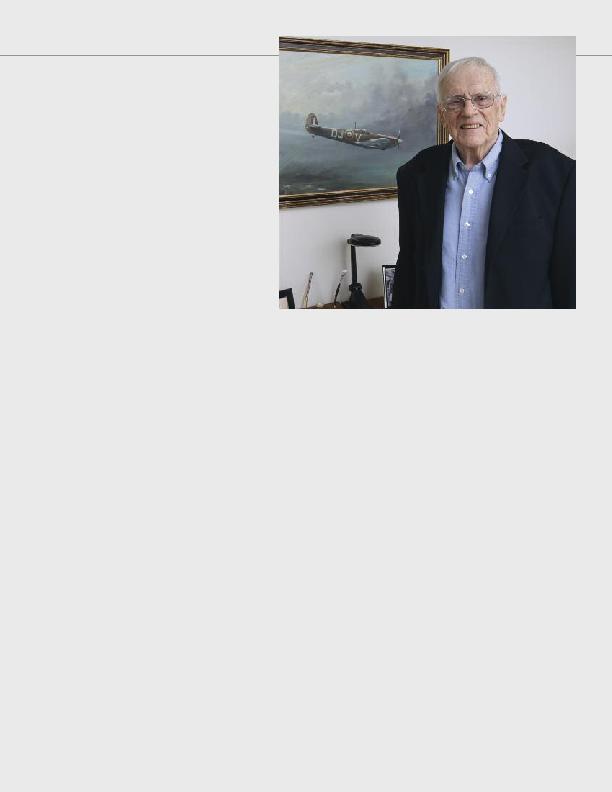
spent 11 years at Saltus and his parents intended to
send him abroad to further his education. But those
plans were scuppered by the Second World War.
"Dad came home one night and I told him I'd
joined the Bermuda Volunteer Rifles Corps
(BVRC)," Francis remembers. "My father blew
a fuse because I was so young."
Flying School was established in 1940 and he was
among the first batch of eight volunteers to sign up.
Many hours of groundwork were spent studying
weather patterns, navigation and airplane mainte-
nance before recruits were allowed to try their skill
in the floatplane. "It was very exciting," recalls the
91-year-old Southampton resident. "I remember
flying around Harrington Sound and saw a friend
of mine at his dock. I landed, taxied up to his dock
and saw that his 10-year-old daughter was there. I
asked if she wanted to go for a ride and she said,
`Yes!' That was the first person I ever took up. I had
logged only eight hours' flying time!"
After training in Canada, he got his "wings" in
1941. He returned to England and joined the 74th
Squadron, flying Spitfires with the RAF Second
Tactical Air Force. Promoted to Lieutenant, he
provided air support to troops on the ground, firing
rockets at enemy targets and conducting reconnais-
sance missions--with just one "close scrape."
and it was a tremendous transition, as the Spitfire
had a cruising speed of 240 miles an hour, the
Meteor 500 miles an hour. I remember one day I
had left the station on a reconnaissance flight and
was flying at 35,000 feet when I said to myself, I
wonder how fast this thing will go? I rolled it over
and stuck the nose down. I gathered speed at a fast
rate and when I went to pull out, nothing happened
--it just kept going, there was no pressure at the
controls. I pulled the dive brakes and there was a
tremendous explosion and I blacked out. When I
woke up I thought I was in heaven. Everything was
down, and the horizon came into sight. I looked
out at the wings and almost jumped out of the
plane as they were corrugated and bent under the
pressure. I gave a mayday and flew back."
when the conflict ended, he remained with the
RAF for a year before returning to Bermuda and
entering business. After stints as manager at
Masters--where he met his bookkeeper wife
June--Standard Hardware and PW Marine,
Francis was hired by British American in 1956 to
set up a branch office in Trinidad and before long
was an insurance underwriter for the Caribbean.
covering the whole of Latin America. Francis re-
mained there with his wife and four children for 18
years until the Sandinista Revolution of the 1980s.
sailing and reading. He still has fond memories of
his days at Saltus, when his mother Shirley insisted
he use his middle name "Francis," rather than
"Howard Jr." "But some of my Saltus friends didn't
know either name--they all called me by my nick-
name, `Kitten,' " he smiles. "My older half-brother
Carl was dubbed `Pussycat'--and the theme was
simply passed down to me!"
wonder
how fast
this thing
will go?'
Stephens / '39
A